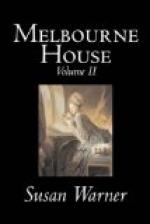What Nora’s “because” meant, Daisy did not know; that it had reference to some supposed advantage of place, was pretty certain. Daisy stood thinking about it while she saw Nora dressed, and then ran into the drawing-room to take the effect of the tableau. The curtain was withdrawn; Daisy was astonished; she had no idea that Nora could be so changed by a little arrangement of lights and dress. The picture was exceeding pretty. Nora’s black hair and bright cheeks peeped out from under the shadowing red cardinal, which draped her arms also—Mrs. Sandford had mysteriously managed it. She had got over her hatred of the part, for she looked pleased and pleasant; and the little basket in her hand and the short petticoat and neat little feet completed a tidy Red Riding-Hood. The applause was loud. “Lovely!” the ladies said. “What a sweet little thing! how beautiful she looks!” Nora did not smile, for that would have hurt her picture; but she stood with swelling complacency and unchanging red cheeks as long as the company were pleased to look at her.
“Who is that, Daisy?” asked her father, near whom Daisy had stationed herself.
“It is Nora Dinwiddie, papa.”
“She is a pretty little girl. When does your turn come?”
“I do not know, papa.”
“Not know! Why I thought all this was your affair.”
“O no, papa; it is Preston’s affair.”
Off ran Daisy however when the curtain fell, or rather when it was drawn, to see the getting ready of the next tableau. There was something of a tableau on hand already. June stood holding up a small featherbed, and two little figures in white nightgowns were flying round, looking and laughing at two exceedingly fierce, bearded, moustached, black-browed individuals, on whose heads Mrs. Sandford was setting some odd-looking hats.
“Who are those, Nora?” said Daisy to Little Red Riding-Hood.
“Daisy, did you like it? did I stand well?”
“Yes, I liked it very much; it was nice. Nora, who are those two?”
“Why one of ’em is Preston—I don’t know who the other is. Daisy, did you ask about Esther?”
Could it be possible that Preston had so transformed himself? Daisy could hardly see that it was he. His fellow she did not recognize at all. It was big George Linwood.
“Now are the little princes ready?” said Preston. “Because we will finish up this business.”
“O you won’t let the featherbed come down on us?” cried Jane Linwood.
“If you don’t be quiet and keep still, I will,” said Preston. “Let only your eye wink or your mouth move to smile—and you are an unlucky prince! I am a man without mercy.”
“And I am another,” said George. “I say, old fellow, I suppose I’m all right for that French pikeman now, hey? After this smothering business is attended to.”
“You think the trade is the thing, and the costume a matter of indifference?” said Preston. “In the matter of morals I dare say you are right;—in tableaux before spectators it’s not exactly so. Here June—hand on your big pillow there—”




